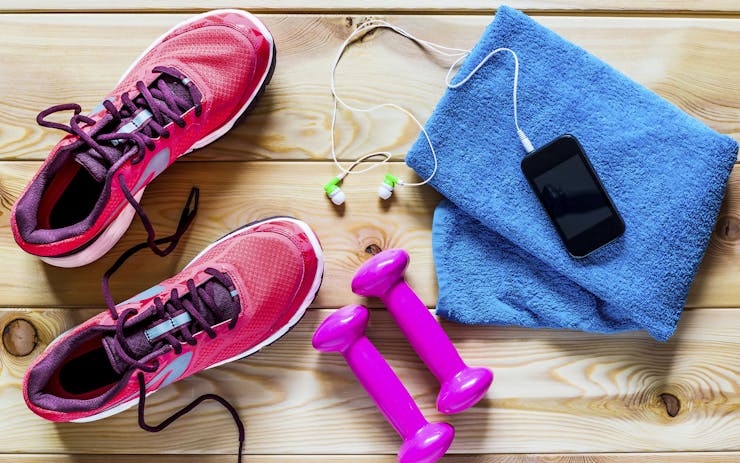Cannabis isn’t thought of as the most stimulating substance in the world, but it may be time to reconsider the lazy stoner stereotype. As it turns out, cannabis and exercise have quite the involved relationship. The Leafly team did some research to find out just how much getting stoned and getting ripped have in common.
Here’s what we found out:

1. Cannabis Gives “Runner’s High” a New Meaning
It’s not news to the medical community that the human body stores tetrahydrocannabidiol (THC), the main psychoactive in cannabis, in fat. However, a study put out this August in Drug and Alcohol Dependence has shown that this storage process can give exercisers an extra boost, even up to 28 days after consumption.
As the body begins to burn off fat, small amounts of THC are released back into the bloodstream, producing an effect similar to consuming a small amount of cannabis. THC blood levels increased by approximately 15% immediately after moderate exercise, yet this increase was no longer present two hours after the workout.
This study also showed a correlation between THC release and BMI. The greater the BMI, the greater the increase in THC reintroduced to the body.

2. Well, Actually, “Runner’s High” and “Stoner’s High” are Kind of the Same Thing
Shop highly rated dispensaries near you
Showing you dispensaries nearWe all know that exercise is good for you. Not only is it key to preventing obesity, which causes heart disease, diabetes, and many other illnesses, exercise is also linked to the creation of new brain cells and decreases in stress.
Yet, contrary to popular thought, it’s not just the endorphins (the compounds which make you feel excited after activities such as exercise and sex) that make physical activity so great. A 2003 study found that exercise actually activates the endocannabinoid system in the same way that the cannabis plant does. The endocannabinoid system is a group of lipids (types of fats) and cell receptors that cannabinoids (compounds like THC and CBD) bind to inside the body. It’s responsible for easing pain, controlling appetite, and influences mood and memory.
Perhaps as a coping mechanism for easing pain, the body naturally produces its own cannabinoids during exercise. In the aforementioned study, researchers found that human-produced cannabinoids increase as you exercise, causing you to feel a little “high.”

3. Muffin Tops Have Found an Enemy in Cannabis
Moderate exercise is helpful for burning off that scone you grabbed along with your latte this morning. But calories burned with exercise isn’t the only thing that helps you lose weight.
A recent study published in the American Journal of Medicine has found that regular cannabis consumers have fasting insulin (insulin in your body before eating) levels 16% lower than non-consumers. The study also found that cannabis consumers had 17% lower insulin resistance levels and lower average waist circumferences.
Insulin is the hormone that tells your cells to take in sugar (glucose) to use for energy. If you have too much unused sugar in your cells, you will gain weight. If your body isn’t handling insulin properly, you may also gain weight. The study’s findings show that the cannabinoids found in the cannabis plant help facilitate metabolic function.
Coupled with the pain-relieving effects of both plant and human-derived cannabinoids, cannabis and exercise seem to go hand in hand if you’re looking to improve your physical health. (Just be sure to cut back on the Taco Bell.)
Photo credits: Thomas Hawk; Sangudo; ccdoh1; Helga Weber via photopincc





